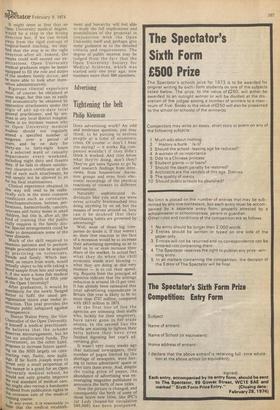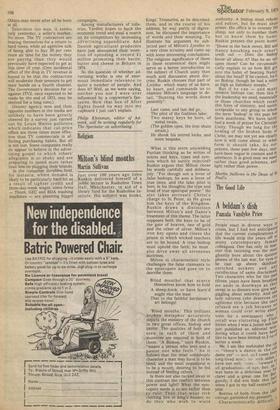Tightening the belt
Philip Kleinman
Does advertising work? An odd and irrelevant question, you may think, to be putting to serious people at a time of economic crisis. Of course — don't I hear you saying? — it works. Big companies wouldn't if they didn't think it worked. And they know what they're doing, don't they? They've got sales figures to go by and research findings from interviews, from housewives' discussion groups and even from electronic recordings of the physical reactions of viewers to different commercials.
Naturally sophisticated individuals like you and me were never actually brainwashed into doing anything by an ad, but the masses of morons around us, how can it be doubted that their purchasing habits are governed by advertising?
Well, most of those big companies do doubt it. If that weren't so, their first reaction in the face of a recession would be to increase their advertising spending so as to hold on to or even increase their share of the market. In actual fact what they do when the chill economic winds start blowing — what they are doing at this very moment — is to cut their spending. Reports from the principal ad agencies indicate that the average reduction is around 10-15 per cent. It has already been estimated that total advertising expenditure in Britain this year is likely to be no more than £757 million, compared with £815 million in 1973.
In the first line of fire the agencies are trimming their staffs who, luckily for their employers, have never gone in for trade unions. In the second line the media are starting to tighten their belts before they have even finished digesting last year's advertising glut. It wasn't very many weeks ago that national newspapers, their number of pages limited by the shortage of newsprint, were having to ration advertisers' space or even turn them away. And, despite the rising price of paper, the abundance of advertising was encouraging magazine publishers to announce the birth of new titles.
Now the picture is changed, and consequently the birth of some of those brave new titles, like IPC's 1st Lady (hoped-for circulation 500,000) has been postponed.
Others may never after all be born at all.
Television too was, it seems only yesterday, a seller's market. No more. The TV contractors are bracing themselves for a return to hard times, while ad agencies talk of being able to buy 20 per cent more air time for the money they are paying than they would previously have expected to get at this time of year. (One incidental effect of the drop in TV revenue is bound to be that the contractors will moderate their pressure to get their hands on a fourth channel. The Government's decision for or against ITV2, once expected to be made by the end of 1973, may be shelved for a long time.) Gloomy agency men and their opposite numbers in the media are unlikely to have been greatly cheered by a survey just carried out by Louis Harris pollsters which indicates that cut-price offers are three times more effective than TV commercials in affecting purchasing habits. But all is not lost. Some companies really do appear to believe in the adver tising gospel to which others' allegiance is so shaky and are preparing to spend more rather than less on plugging their brands. In the consumer durables field for instance, where demand is likely to be particularly hard hit as a result of tighter credit and three-day-week wages, some firms — Thorn, GEC and BDA washing machines — are planning bigger campaigns.
Among manufacturers of toiletries, Yardley hopes to buck the economic trend and steal a march on its competitors by increasing advertising expenditure. And Danish agricultural producers have just announced their intention of spending a record E1 million promoting their bacon, butter and cheese in Britain in 1974.
So the question of whether advertising works is one of enormous immediate relevance to quite a number of people. And does it? Well, as we were saying, neither you nor I were ever influenced by a copywriter's fantasies. How that box of After Eights found its way into my cupboard I just can't explain.
Philip Kleinman, editor of Adweek, will be writing regularly for The Spectator on advertising.



































 Previous page
Previous page